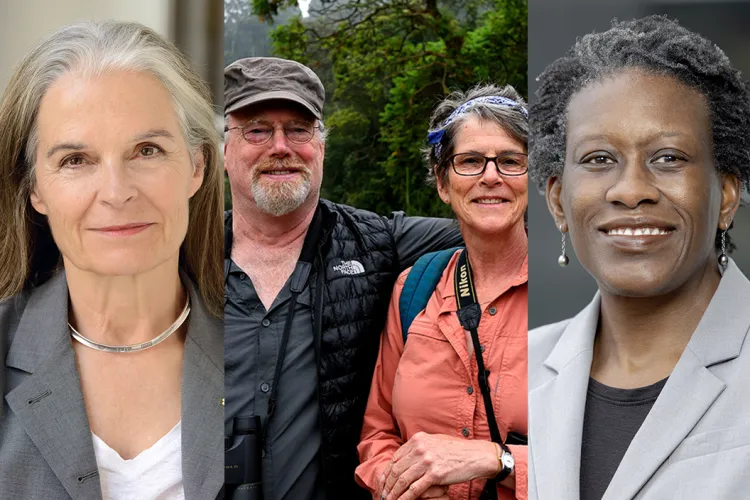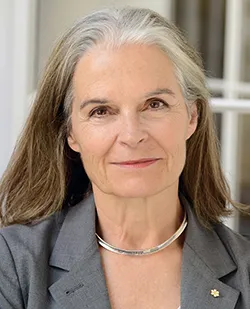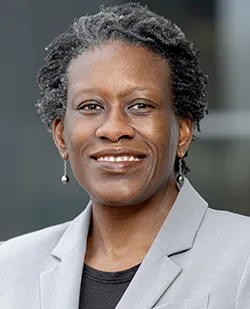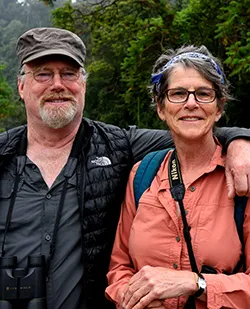Architect, Economic Justice Advocate, and Wildlife Conservationists Named 2023 Honorary Degree Recipients

During Swarthmore College’s 151st Commencement ceremony on May 21, President Valerie Smith will award honorary degrees to four distinguished alumni: a Doctor of Arts to architect Marianne McKenna ’72, a Doctor of Laws to USDA administrator Karama Neal ’93, and Doctors of Sciences to wildlife conservationists Bill Weber ’72 and Amy Vedder ’73.
In addition, approximately 450 undergraduates in the Class of 2023 will receive degrees at the ceremony on Parrish Lawn.
Marianne McKenna ’72

Marianne McKenna ’72 is a founding partner of KPMB Architects, a leading Canada-based firm committed to “shaping a sustainable and equitable future to improve people’s lives through design.” She is an advocate for using architectural design to foster community and positively impact the urban and natural environment.
After graduating from Swarthmore with a degree in art history, McKenna attended Yale University, where she earned a master's degree in architecture. After Yale, she worked in Montreal, and in London, returning to Canada in 1980 to join Barton Myers Associates in Toronto, where she was made an associate in 1981. At Barton Myers, she met the future co-founders of Kuwabara Payne McKenna Blumberg, now known as KPMB Architects. The firm now has 10 partners, and its diverse portfolio includes culture, health care, education, and climate-responsive design projects. KPMB has won more than 400 awards — including 18 Governor General’s Medals in Architecture, one of Canada’s most prestigious honors.
In 2012 she was appointed an Officer of the Order of Canada for creating “architecture that enriches the public experience.” She was named one of Canada’s top 100 most powerful women by the Financial Post, and one of the top 30 “outstanding women in architecture and design” by Azure. In 2021, McKenna was the first woman to receive a Lifetime Achievement Award from the Design Futures Council.
Among McKenna’s notable projects is the Royal Conservatory TELUS Centre for Performance and Learning and its iconic Koerner Hall. Her work also includes the Rotman School of Management, the Kellogg School of Management at Northwestern University, the revitalization of historic Massey Hall in Toronto, and The Brearley School in New York City, which won the 2022 Governor General’s Medal for Architecture. She is currently leading the design for the Yale Dramatic Arts Building and Yale Repertory Theatre.
McKenna’s love of architecture extends to lecturing, teaching, and mentoring. In 2016, she was the Norman R. Foster Visiting Professor at Yale University. Her work is chronicled in the 2015 film Making Space: Five Women Changing the Face of Architecture.
Image courtesy of Guntar Kravis
Karama Neal ’93

Karama Neal ’93 has dedicated her career to promoting equity and opportunity for underserved communities, focusing on improving the lives of those who live in rural America. She currently serves as an administrator for the Rural Business-Cooperative Service within the United States Department of Agriculture (USDA), which helps create jobs and support economic development with a particular focus on the bio-based economy, food supply chain, and energy sectors.
Neal earned her undergraduate degree in biology at Swarthmore before going on to receive a doctorate in genetics from Emory University and a master’s in bioethics and health policy from Loyola University Chicago. She initially worked in bioinformatics before focusing on a career with “a more immediate effect on human well-being.”
Before her appointment at the USDA, Neal served as president of Southern Bancorp Community Partners, a community development financial institution loan fund and financial development organization promoting economic mobility in rural Arkansas and Mississippi. Neal also served for two years as interim director and then director of the Southern Good Faith Fund, a nonprofit promoting family economic mobility through public policy and direct service.
In 2013, inspired by her family’s ownership of rural heirs’ property in Arkansas, she started a statewide grassroots organization, Heirs of Arkansas, promoting passage of the Uniform Partition of Heirs Property Act, which passed with no dissent in 2015. Her work on heirs property was awarded the 2020 Advancing Equity Award from the Clinton School of Public Service. In 2019, she started the Neal Firm, a consultancy focused on community development and impact analysis.
Neal, who for six years authored the award-winning ethics-in-action blog “So What Can I Do?,” served on the boards of the Arkansas Access to Justice Commission, the Little Rock Branch of the Federal Reserve Bank of St. Louis, and the Mary Reynolds Babcock Foundation, which works with organizations to alleviate poverty and increase social and economic justice in the South. She has written frequently and delivered public talks on topics spanning family economic security, internet equity, and career development. She has taught at Emory University, Loyola University Chicago, Shorter College, and the Arkansas School for Mathematics and Sciences.
Image courtesy of Karen E. Seagrave
Bill Weber ’72 and Amy Vedder ’73

Conservationists Bill Weber ’72 and Amy Vedder ’73 are co-founders of the Mountain Gorilla Project, now known as the International Gorilla Conservation Programme. Their work is credited with helping bring mountain gorillas back from the brink of extinction, while also developing the concepts of ecotourism and local benefits as new approaches to supporting conservation.
After graduating from Swarthmore, Weber and Vedder joined the Peace Corps in Africa for two years. It was in the Democratic Republic of Congo (then Zaire) where they first observed gorillas, sparking their interest in wildlife conservation. The experience also convinced them that conservation in a context of poverty required addressing local human needs. Their graduate studies at the University of Wisconsin allowed them to further develop this interdisciplinary approach, which they then applied to the real-world situation in Rwanda.
In the late 1970s, with mountain gorillas on the verge of extinction, much of their habitat in Rwanda was slated to be destroyed for a cattle-ranching project that would generate limited local revenue. Weber and Vedder were convinced there was an alternative, and they developed an ecotourism plan to save the gorillas and monetize the conservation efforts through tourism. Their efforts were widely successful: The population of mountain gorillas has since grown from only a few hundred to more than 1,000. They are Rwanda’s premier attraction, helping the country’s tourism industry generate more revenue than coffee, tea, and minerals exports combined, while also supporting significant local employment and a novel program of sharing park income with neighboring communities. Their work is described in their critically acclaimed book, In the Kingdom of Gorillas.
Following their work with gorillas, Weber and Vedder took on leadership positions with the Wildlife Conservation Society (WCS), through which they created a major Congo Basin initiative that ultimately established more than a dozen new forest conservation areas. Eventually, Vedder directed a global portfolio of projects as vice president of the WCS Living Landscapes Program, while Weber initiated a new WCS North America Program. During their 20-year tenure at WCS, they helped promote dozens of African nationals, Native Americans, and women into leadership positions.
Weber and Vedder continue to educate and inspire future conservationists. Since 2013, they have lectured at the Yale School of the Environment, earning teaching awards while leading two conservation-in-practice seminars and co-leading summer conservation study tours in Rwanda. They also continue to advise, write, and speak about wildlife and wildland conservation – with a human touch.
Image courtesy of Harvey Locke



